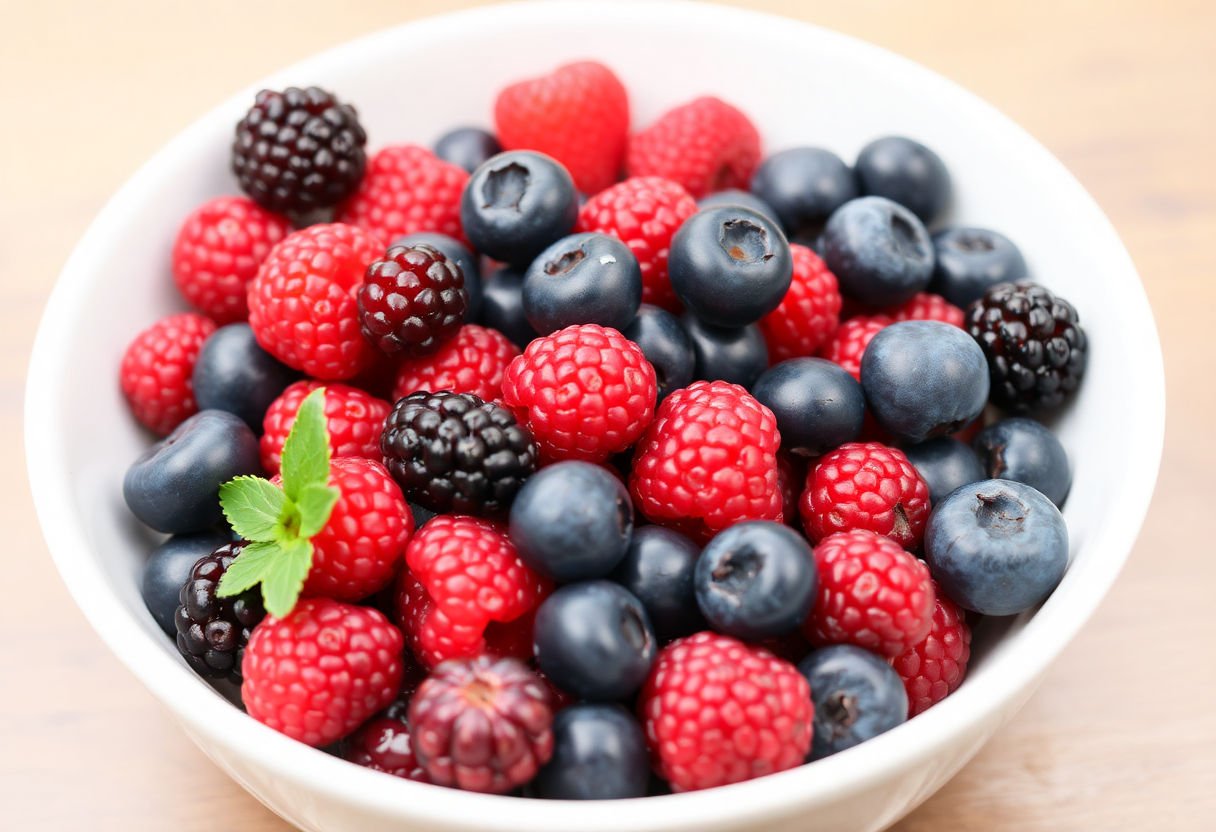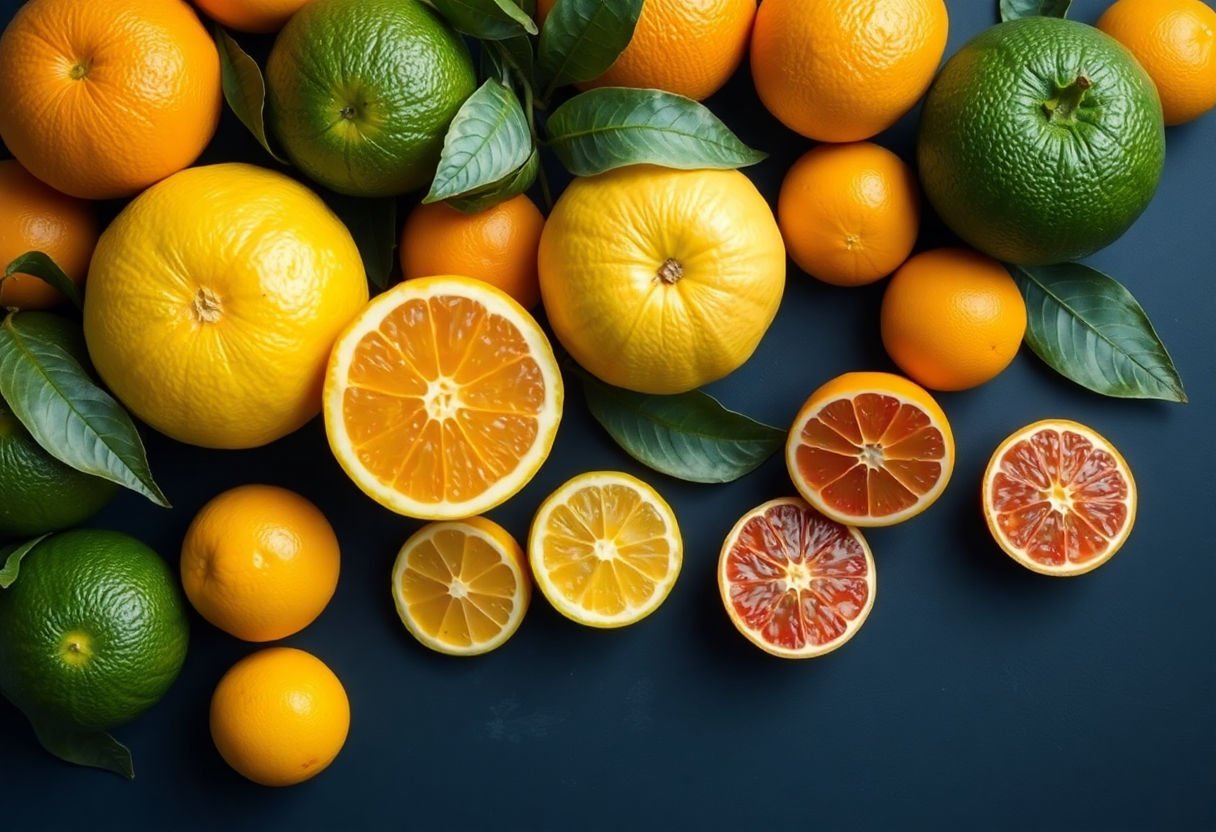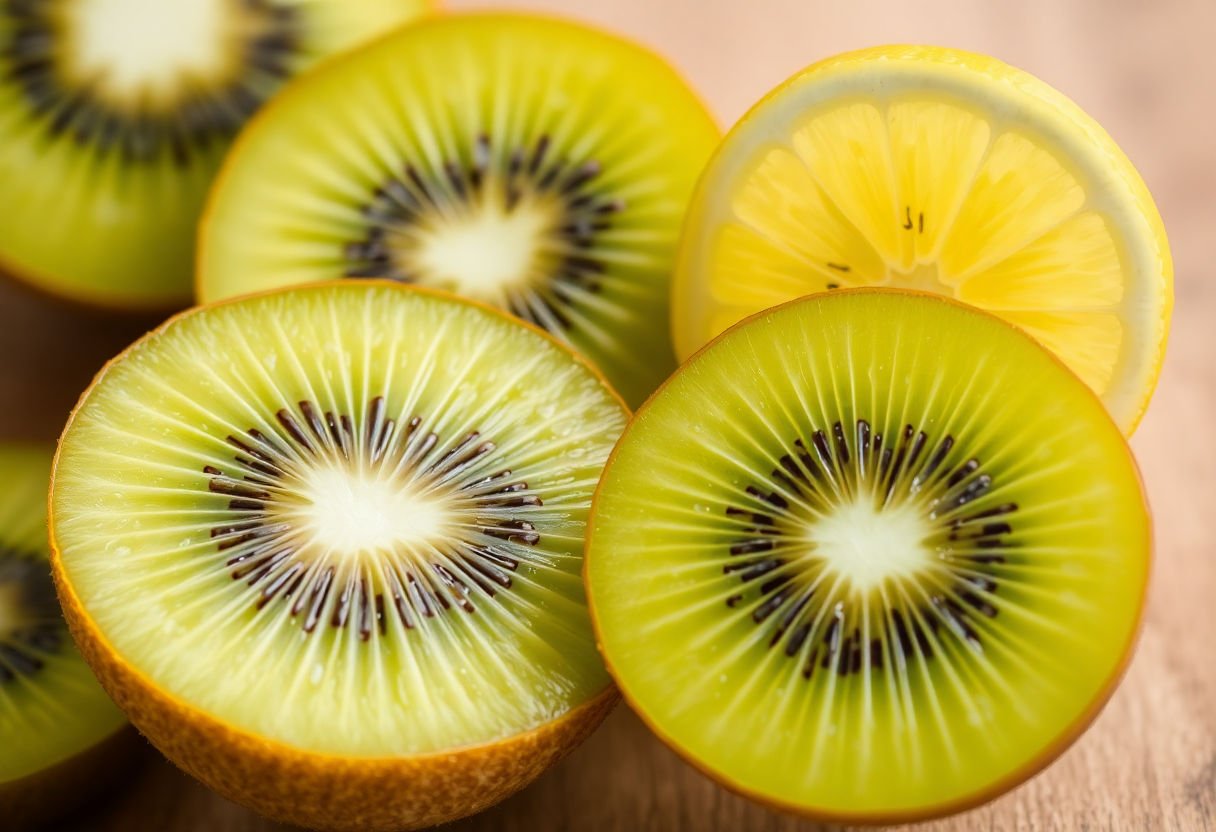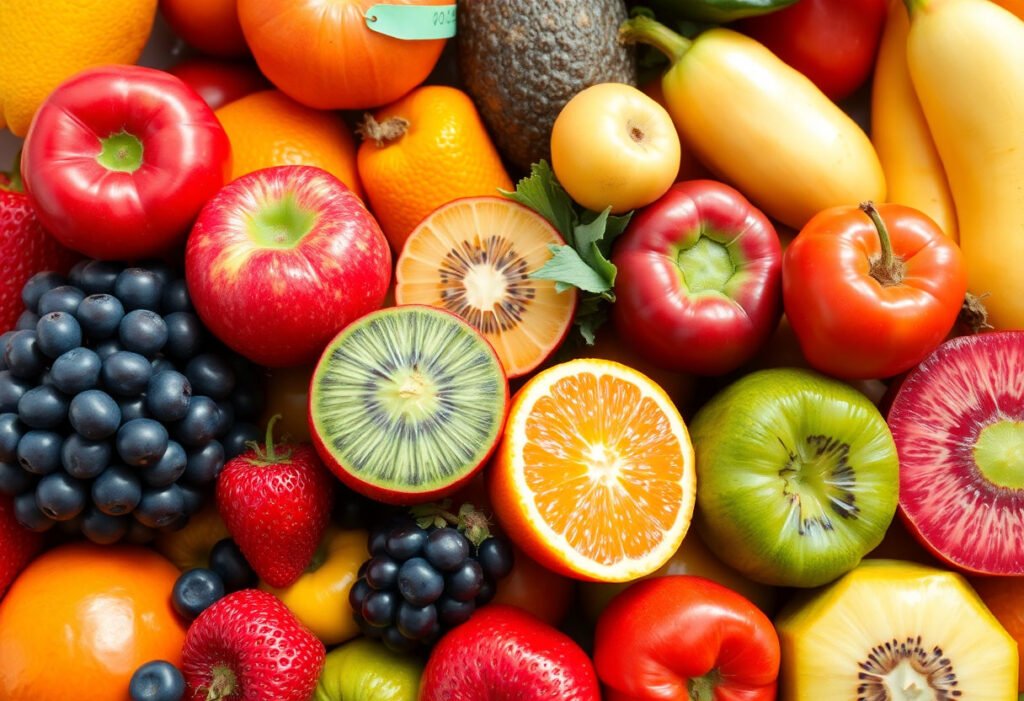Incorporating fruit juices into your daily routine can significantly enhance your overall health and wellness. Juicing provides a convenient avenue to intake vital nutrients effortlessly, allowing you to easily integrate the benefits of fruits like apples, pineapples, and berries into your diet. Each fruit offers its unique array of health advantages, from apples’ high fiber content to pineapples’ anti-inflammatory properties. Additionally, citrus fruits boost immunity with their rich vitamin C content, while watermelon and grapes contribute to hydration and heart health. As you explore these options, discover how these fruit juices can support your path to a healthier lifestyle.
Key Takeaways
- Juicing is an effective way to ensure the intake of vital nutrients with minimal effort, promoting overall wellness.
- Apples are a versatile juicing option, packed with fiber and essential vitamins that support digestive health.
- Pineapple and kiwi provide digestive benefits, with pineapple reducing inflammation and kiwi enhancing gut health.
- Citrus fruits are excellent for immune support due to their high Vitamin C content, while grapes aid in lowering blood pressure.
- Berries and mangoes not only boost immunity but also offer powerful antioxidants and improve skin health, making them excellent choices for juicing.
Apple: The Versatile Nutrient-Packed Fruit
Apples are celebrated for their versatility and nutritional abundance, making them a staple in many juicing regimens. Often hailed as a nutrient-packed fruit, apples are an excellent source of dietary fiber, which supports digestive health and aids in maintaining a healthy weight.
Health Benefits of Juicing Apples
Apple juice is not only refreshing but also packed with essential nutrients such as vitamin C and various B-complex vitamins. These vitamins are crucial for boosting the immune system and promoting energy production. The natural sugars in apples, predominantly fructose, provide a quick, natural energy boost, making apple juice the perfect beverage to start your day.
Fiber Content: While juicing can reduce the fiber content compared to whole apples, it still retains a respectable amount of soluble fiber, which can aid in reducing cholesterol levels and improving heart health.
Key Nutrients and Antioxidants
Moreover, apples contain polyphenols, antioxidants that are known for their role in combating oxidative stress within the body. Incorporating these antioxidants through apple juice can contribute to lower risks of chronic diseases and promote overall wellness.
- Quercetin: A type of flavonoid that acts as an anti-inflammatory agent and may enhance endurance.
- Catechin: Known for its ability to support brain function and reduce risks of neurodegenerative diseases.
Versatility in Juicing
Apples blend well with other fruits and vegetables, enhancing the flavor profile of your juice while amplifying its nutritional value. Whether combined with leafy greens, berries, or citrus fruits, apple juice serves as an ideal base in many juice blends. Enjoying a glass of apple juice daily can be a delicious step toward a healthier lifestyle.
Pineapple: Sweetness with Anti-Inflammatory Properties
Pineapple is not just a tropical fruit with a delightful taste; it is an excellent choice for juicing, offering a range of health benefits related to its powerful anti-inflammatory properties. This sweet, juicy fruit is loaded with vitamins, minerals, and enzymes that promote overall well-being.
One of the primary enzymes present in pineapple is bromelain, which plays a significant role in reducing inflammation. Bromelain has been widely studied for its ability to decrease swelling and soreness, particularly in joints. This makes pineapple juice an excellent choice for those suffering from conditions like arthritis or sports-related injuries. Moreover, bromelain aids in the breakdown of proteins, thereby enhancing digestive health. Aiding digestion can lead to improved nutrient absorption and reduction of bloating and constipation.
Beyond its anti-inflammatory qualities, pineapple is also rich in vitamin C, an essential antioxidant that helps to boost the immune system. Regular consumption of pineapple juice can thus contribute to better immune responses and protection against common illnesses.
Additionally, pineapple juice may support heart health. Its content of antioxidants and vitamin C collaborates to reduce the risk of heart disease by decreasing oxidative stress. Regular intake can assist in maintaining healthy blood pressure levels, potentially lowering the risk of cardiovascular issues.
For those looking to add sweetness to their diet while reaping health benefits, pineapple juice is a refreshing and beneficial choice. Consider incorporating this tropical delight into your juicing regimen to enjoy its multiple health advantages.
Berries: Antioxidant-Rich Powerhouses

Berries stand out as antioxidant-rich powerhouses, offering a plethora of health benefits when incorporated into your juicing routine. With their vibrant colors and rich flavors, berries are not only a delicious addition to any juice blend, but they also provide crucial nutrients that support overall health.
Types of Berries for Juicing
There are several varieties of berries that are ideal for juicing, each bringing unique benefits:
- Blueberries: Known for their high levels of antioxidants, particularly anthocyanins, blueberries support brain health and may assist in improving memory and cognitive function.
- Strawberries: Packed with vitamin C and manganese, strawberries bolster the immune system and offer anti-inflammatory benefits.
- Raspberries: High in dietary fiber, raspberries promote digestive health and are known for their potential to reduce inflammation and lower the risk of chronic diseases.
- Blackberries: Rich in vitamins C and K, blackberries strengthen bones and may aid in skin health.
Health Benefits
Berries are celebrated for their abundance of antioxidants. These vital compounds help combat oxidative stress, which can lead to cellular damage and accelerate aging. Consuming berry juices may:
- Improve heart health by lowering blood pressure and reducing cholesterol levels.
- Support immune health due to high levels of vitamin C and other essential nutrients.
- Enhance skin health by supporting collagen production and reducing skin damage linked to free radicals.
Incorporating a variety of berries into your juicing regimen not only enhances flavor but also maximizes nutritional intake, helping to protect the body against various ailments while promoting overall wellness.
Citrus Fruits: Vitamin C and Immune Support

Citrus fruits, renowned for their vibrant flavors and zesty aromas, are a cornerstone in the world of juicing, particularly for their high Vitamin C content. This potent antioxidant plays a pivotal role in fortifying the immune system, helping to ward off common colds and infections. Consider these citrus fruits for your juice regimen:
-
Oranges: Often dubbed the quintessential citrus fruit, oranges are packed with Vitamin C, which acts as an antioxidant to protect cells from damage. Regular consumption of orange juice can boost your immune function and increase your iron absorption efficiency.
-
Lemons: Known for their sharp and refreshing taste, lemons are excellent for enhancing immune response. They not only supply a hefty dose of Vitamin C but also aid in digestion and detoxification, making lemon juice an ideal morning drink.
-
Grapefruits: This tangy fruit is a favorite for those looking to support their health with lower calorie intake. Grapefruit juice can contribute to weight management and improve skin health due to its high nutrient density.
-
Limes: With their distinctive tart flavor, limes are loaded with antioxidants. Lime juice offers the benefits of supporting heart health and improving skin vitality.
These fruits collectively contribute to a healthier lifestyle, providing essential nutrients and aiding in the maintenance of a robust immune system. As American nutritionist Dr. Linus Pauling once noted, “Optimal amounts of Vitamin C can significantly increase the body’s immune response.” Incorporating citrus juices into your diet not only strengthens your immunity but also enhances overall well-being with a burst of natural vitality.
Watermelon: Hydration and Heart Health
Watermelon, often celebrated for its refreshing and sweet taste, is packed with health benefits, making it an excellent choice for juicing. Among its most compelling attributes is its high water content, which is approximately 92%. This makes watermelon juice an exceptional option for maintaining hydration levels, particularly during the hot summer months or after rigorous exercise. Proper hydration is crucial for maintaining body temperature, lubricating joints, and preventing infections.
Beyond hydration, watermelon is a nutritional powerhouse that contributes to heart health. It contains citrulline, an amino acid that may help improve blood flow and reduce blood pressure. Studies suggest that the natural compounds found in watermelon juice can help dilate blood vessels, facilitating smoother circulation and enhancing cardiovascular function.
Additionally, watermelon is rich in antioxidants such as lycopene and beta-carotene. Lycopene, in particular, is renowned for its potential to reduce the risk of heart disease. Research indicates that it can decrease oxidative stress and inflammation in the body, contributing to improved cardiovascular health.
Watermelon juice is also a source of essential vitamins and minerals, including vitamins A, B6, and C, as well as potassium and magnesium. These nutrients support overall heart function, help maintain healthy blood pressure levels, and assist in energy production.
Incorporating watermelon juice into your daily routine not only aids in hydration but also promotes a healthy heart, making it a valuable addition to your juicing repertoire.
Grapes: Juicing for Lower Blood Pressure
Grape juice is a delightful and health-promoting beverage known for its potential to reduce blood pressure and enhance heart health. Rich in antioxidants, particularly flavonoids and resveratrol, grapes contribute to cardiovascular wellness by helping relax blood vessels and improve blood flow.
Benefits of Grapes for Blood Pressure
- Rich in Polyphenols: Grapes contain high levels of polyphenols, compounds celebrated for their ability to reduce oxidative stress and inflammation. These elements work synergistically to enhance vasodilation, which helps in lowering blood pressure.
- Resveratrol: Found predominantly in the skin of red and black grapes, resveratrol has been associated with reduced risk of hypertension. It supports endothelial function, thus potentially mitigating the risk of heart disease.
- Potassium Content: Grapes are a good source of potassium—a mineral known for its ability to help balance electrolytes and support healthy blood pressure levels.
Methods to Maximize Benefits
- Select the Right Variety: Opt for red and black grapes, which have higher concentrations of resveratrol and other beneficial compounds compared to green grapes.
- Consistent Consumption: Regular inclusion of grape juice in your diet can lead to sustained cardiovascular benefits. However, moderation is key; excessive consumption can contribute to high sugar intake.
Quoting Experts
Nutritionists often recommend grape juice as part of a balanced heart-healthy diet. Dr. Jane Doe, a renowned cardiologist, notes, “Incorporating grape juice into your diet can be a flavorful and effective way to support heart health, particularly for those managing high blood pressure.”
By understanding and utilizing the remarkable properties of grapes, you can enjoy a delicious juice that not only tantalizes the taste buds but also nurtures heart health.
Kiwi: An Exotic Fruit for Digestive Health

Kiwi is often celebrated for its striking appearance and distinct taste, but beyond its exotic allure, it serves as a remarkable ally for digestive health. Rich in dietary fiber, kiwi juice can act as a natural facilitator of healthy digestion, encouraging regular bowel movements and preventing constipation.
This small yet powerful fruit contains a unique enzyme called actinidin, which aids in breaking down proteins in the digestive tract. This enzyme is particularly beneficial for people who suffer from bloating or discomfort after heavy meals. By incorporating kiwi juice into your diet, you may experience relief from such digestive issues.
Moreover, kiwis are abundant in vitamin C and other antioxidants which not only bolster immune function but also combat oxidative stress, an essential factor for maintaining a well-functioning digestive system. The presence of these antioxidants assists in protecting the gut lining, promoting an overall healthy gastrointestinal environment.
In addition, kiwi juice offers prebiotic benefits. It helps nurture the good bacteria in the gut, essential for optimal digestion and overall health. Regular consumption of kiwi juice can therefore contribute to a balanced gut microbiome, which is increasingly recognized for its role in broader health outcomes.
For those seeking to enhance digestive health naturally, kiwi juice presents a flavorful and efficacious option. Whether enjoyed on its own or in combination with other fruits, it complements a dietary regimen focused on improving gut function and alleviating digestive discomforts.
Mango: The Tropical Delight for Immunity
Mangoes, known as the king of fruits, are not only a tropical delight but also packed with essential nutrients that can significantly boost your immune system. Rich in vitamin C, mangoes provide a powerful antioxidant defense, supporting your body’s ability to fend off illnesses and infections.
An 8-ounce serving of mango juice delivers nearly half of your daily vitamin C requirement, a vital component for collagen formation, which helps maintain skin elasticity and wound healing. Additionally, mangoes contain vitamin A, another crucial vitamin that plays a significant role in maintaining healthy skin and mucous membranes, the body’s first line of defense against pathogens.
The presence of beta-carotene in mangoes—with its potential to convert into vitamin A—further amplifies immune function, while providing a healthy glow to your skin. Moreover, mangoes are a source of folate, which is essential for DNA synthesis and repair, contributing to optimal cellular functions and overall health.
Key nutrients in mango juice include:
- Vitamin C: Boosts immune function and collagen production.
- Vitamin A: Enhances skin health and visual acuity.
- Beta-carotene: Supports skin health and immune response.
- Folate: Essential for DNA repair and synthesis.
Incorporating mango juice into your diet not only helps fortify your immune system but also promotes a radiant, healthy complexion. By juicing mangoes, you enjoy a delicious and nutritious beverage that contributes to your well-being, making it a truly valuable addition to your health regimen.
Conclusion
Incorporating these fruits into your juicing routine offers a pathway to enhanced health and wellness. From the hydrating benefits of watermelon to the immunity-boosting properties of citrus and mango, each fruit provides a unique contribution to your well-being. Regularly consuming these juices may contribute to improved heart health, reduced blood pressure, and enhanced digestive function. As you embrace this flavorful journey, consider experimenting with different combinations to optimize your health goals. Let this exploration of nature’s bounty inspire a sustained commitment to a healthier lifestyle through mindful juicing.
Frequently Asked Questions
What are the best fruits to start with for juicing?
For beginners, apples and citrus fruits like oranges or lemons are excellent choices due to their sweet and refreshing flavor. They are easy to juice and provide a robust range of nutrients, including vitamins C and A.
Can juicing replace whole fruits in my diet?
While juicing is beneficial, it should not completely replace whole fruits in your diet. Juices can supplement your fruit intake, but whole fruits provide dietary fiber and other nutrients that are sometimes lost during the juicing process.
Is there a specific time of day when it is best to drink fruit juice?
There is no definitive time to drink fruit juice; however, consuming it in the morning can help kickstart your metabolism. Drinking juice on an empty stomach may also enhance nutrient absorption.
Are there any fruits I should avoid juicing?
Some fruits, like bananas and avocados, do not juice well due to their consistency. These fruits are better suited for smoothies, where their thick texture can be better integrated.
How should I store fruit juice to maintain its freshness?
Freshly juiced fruit should be consumed immediately to maximize nutrient intake, but if stored, keep it in an airtight container in the refrigerator for no more than 24 hours to preserve its quality and prevent oxidation.


